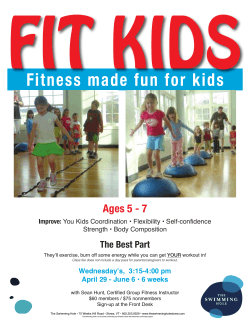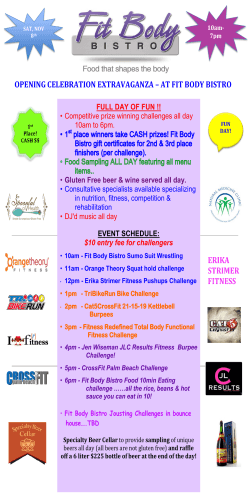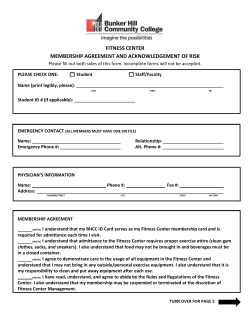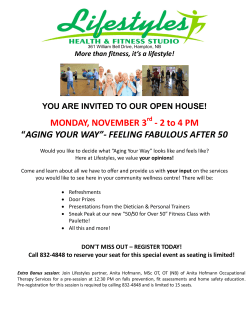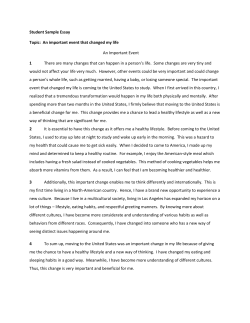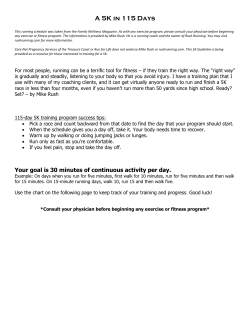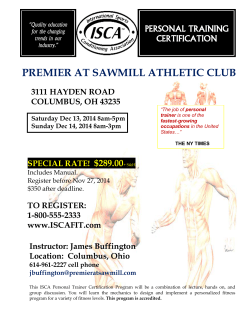
Year 9 PE - Chorlton High School
Year 9 Autumn 2 Edexcel Section 1.1. Exercise and fitness as part of your healthy active lifestyle (1.1.3) Physical activity as part of your healthy active lifestyle (1.1.4) Spring 1 Edexcel Section 1.1. Your personal health and wellbeing (1.1.5) Physical Activity and your healthy mind and body.(1.2.1) Spring 2 Edexcel 2.1 Practical Performance 2.2 Analysis of Performance Summer 1 Edexcel 1.2.2 A healthy, active lifestyle and your Respiratory System 1.2.3 A healthy, active lifestyle and your muscular system Summer 2 Edexcel 1.2.4 A healthy, active lifestyle and your muscular system 1.2.5 A healthy, active lifestyle and your skeletal system ELE – 4 Days Autumn 1 Edexcel Section 1.1. Healthy Active Lifestyles and how they could benefit you (1.1.1.) Influences on your healthy active lifestyle (1.1.2) ELE – 1 Day: Syllabus Subject Content Unit 1.1 Healthy Active Lifestyles Course introduction with focus on theory, practical in relationship to the weight of the course. To gain an awareness of the overall course structure and its requirements. 1.1.1 Healthy active lifestyles and how they could benefit you The three categories of a healthy, active lifestyle. To be able to explain what constitutes a healthy, active lifestyle. To be able to classify the benefits of a healthy, active lifestyle as social, physical or mental. 1.1.1 The benefits of taking part in physical activity. To be able to correctly classify the benefits into the three main categories. To be able to identify the six distinct benefits. 1.1.2 Influences on your healthy, active lifestyle. 1.1.3 Exercise and fitness — health-related exercise. To be able to understand the health-related fitness and their importance to performance. Exercise and fitness — skillrelated fitness. To be able to identify the importance of each of the skill-related components to different physical activities. Health-related fitness tests. Understand and link Health-related fitness to how they are tested. Skill-related fitness tests. To link skill-related fitness tests Training Methods Understand the different training methods used to improve each component of fitness. Training Principles To be able to explain and understand the influences on people to participate in PE. Opportunities for getting involved in sport. Understanding the different principles of training required to allow improvement in fitness. Analysing training sessions To be able to explain a number of initiatives to get and keep people involved in PE Understanding Aerobic and anaerobic training To be able to explain the sports participation pyramid. Different heart rates/training target zones 1.1.5 Your personal health and wellbeing 1.2.1 - To be able to understand the links between exercise, diet, work and rest to consider the relationship between dietary intake and performance. - To explain the requirement of a balanced diet. - To explain the importance of micro, macro nutrients, water and fibre for personal health & well-being. 1.2.1 Physical Activity and your healthy mind and body Somatotypes - Optimum weight - Effects of weight Performance Drugs -legal & illegal & the risks -recreational and socially accepted – Should they be? Risk assessment & injury -warm up / cool down -Why is this important? What are the procedures - Outline optimum weights and factors which cause variance. - Explain the terms anorexia, obese, overweight and over fat. - Explain the effects of smoking and alcohol. - Know the different type of performance enhancing drugs and the effects these have on performance and health. Comprises of 5 sections 2.2.1 -2.2.4 as either: Verbal, written or presentation response. 1. 2.2.1 – rules and regulations 2. 2.2.2 Observe and analyse performance 3. 2.2.3 Evaluate performance 4. 2.2.4 Plan strategies, tactics and practices 2.2.5 data collected in Yr10 analysed & interpreted under controlled condition 2.2.5 Plan personal exercise Plan 2.1 Practical Moderation Exam 1.1/1.2 Theory Exam 1.2.2 Cardiovascular system -Structure, immediate effects and effects of regular participation. - The impact on performance - The effects of rest, diet and recreational drugs on the cardiovascular system 1.2.3 Respiratory system -Structure, immediate effects and effects of regular participation. - The impact on performance - The effects of recreational drugs on 1.2.4 Muscular system -Structure, immediate effects and effects of regular participation. - The impact on performance. - Potential injuries - The effects of diet, rest and recreational drugs on your muscular system 1.2.5 Skeletal system --Structure, immediate effects and effects of regular participation. - The impact on performance. - Potential injuries - The effects of diet on your skeletal system Unit 2.1 Practical Performance Netball – (Girls) Focus upon the ability to outwit opponents and teams using strategies and tactics. Select and apply more advanced skills in different situations 1v1 and to influence a game. Opportunities to referee/coach will develop communication and decision making skills use information gained from analysis of performance to influence and improve play Football – (Boys) should be able to recognise the importance of responding to changing situations within the game in attack and defence combine and perform more advanced football skills consistently applying accuracy and higher quality of technique. constantly faced with strategic and tactical decisions focus on movement off the ball into space. choice of skill execution Badminton (Boys & Girls) Identify different areas of the court and be able to move between these areas using a variety of shots. Develop the ability to outwit opponents using strategies and tactics. recognise the importance of responding to changing situations within the game in attack and defence. Opportunities to score/coach pupils or small groups will develop communication and decision making skills. Fitness- (Boys) Discover ways of improving muscular strength and endurance. Become a reflective leaner and plan training sessions recognize that different types of activities require different type of fitness Record heart rate and reflect on progression/overload. opportunities for pupils to self-assess own performance Unit 2.1 Practical Performance Trampolining- (Girls) replicate more advanced shapes, turns, drops and rotational moves including somersaults demonstrate correct take off and landing technique, refine skills into a 10 bounce routine suggest areas for improvement (self/peer). Use of ICT / Ipad to observe and improve the performance of self and others. Basketball – (Boys) Concise knowledge of the major rules and laws involved in Basketball. Opportunities to referee/coach will develop communication and decision making skills Develop observation skills on peer performances, skills and techniques. Analyse effectiveness of these tactics. Fitness- (Girls) Discover ways of improving muscular strength and endurance. Become a reflective leaner and plan training sessions recognize that different types of activities require different type of fitness Record heart rate and reflect on progression/overload. opportunities for pupils to self-assess own performance Badminton (Boys) Identify different areas of the court and be able to move between these areas using a variety of shots. Develop the ability to outwit opponents using strategies and tactics. recognise the importance of responding to changing situations within the game in attack and defence. Opportunities to score/coach pupils or small groups will develop communication and decision making skills. Football – (Boys) should be able to recognise the importance of responding to changing situations within the game in attack and defence combine and perform more advanced football skills consistently applying accuracy and higher quality of technique. constantly faced with strategic and tactical decisions focus on movement off the ball into space. choice of skill execution Unit 2.1 Practical Performance Rounders– (Girls) Explore rounders using tactics to outwit opponents Will learn to use basic principles of play when selecting and applying tactics for success Enhance advanced skills necessary to outwit opponents in batting, bowling and fielding. select key advanced skills in batting and bowling to execute past a precise fielding. Cricket/ Softball–(Boys) Explore cricket or rounders using tactics to outwit opponents select key advanced skills in batting and bowling to execute past a precise fielding. Will learn to use basic principles of play when selecting and applying tactics for success Enhance advanced skills necessary to outwit opponents in batting, bowling and fielding. Trampolining- (Girls) replicate more advanced shapes, turns, drops and rotational moves including somersaults demonstrate correct take off and landing technique, refine skills into a 10 bounce routine suggest areas for improvement (self/peer). Use of ICT / Ipad to observe and improve the performance of self and others. Practical Moderation Preparation Subject Skills Assessment Homework Students will develop their evaluation skills through evaluating the advantages of a healthy, active lifestyle and the risks related to physical activities. They will develop how to critically analyse skills through critical analysis of theirs' and others performance The students will develop the ability to select and communicate sound knowledge and understanding of factors which affect performance and the benefits of regular exercise on performance. They will develop Identify the main factors that influence taking part Describe reasons for taking part in physical activity. Explain specific terms and their effects on following a healthy active, lifestyle. Unit 2.1 Practical Performance The student will develop advanced skills, techniques and strategies for the activity in practice and competitive situations They will also demonstrate a clear understanding of the rules when taking part End of unit progress test on Units 1.1.1 & 1.1.2. Practical moderation exam at the end of the unit. Task 1 Identify and describe the categories and factors influencing participation. Task 2 Explain the benefits of participating in PA Task 3 Explain the opportunities, initiatives and roles to get different They evaluate the strengths and weaknesses in fitness. They create solutions to improve weaknesses and apply training principles and the risks related to physical activities. The students recall, select and communicate sound knowledge and understanding of factors which affect performance and the benefits of regular exercise on performance Understand the terms of health, exercise and fitness and the link to performance. Know the 5 components of HRE Identify the 6 components of skill related fitness and the importance of each test. Know . what is meant by a PAR-Q and how to assess physical readiness. Explain the principles and methods of training. Understanding how to use the FITT and Goal setting strategies. Describe with examples what SMART targets. Analyse different training zones to evaluate graphs End of Term progress test on Units 1.1.1-1.1.4 End of unit Practical moderation exam. Task 1 Identify and describe the HRF/ SRF components. Task 2 Link the Components of fitness to fitness tests Task 3 Apply the principles of training to a training programme. Understand the links between exercise, diet and rest. Explain the a balanced diet. Understand how these factors affect a healthy lifestyle. Describe different body types and link them to specific sports. Outline why optimum weight is important and its effects Explain specific terms associated with each topic above and their effects with examples. Be able to identify risks and act upon them End of unit progress test on units 1.1.1-1.2.1. Practical moderation exam at the end of the unit. Task 1 Identify and describe a range of performance enhancing drugs. Task 2 Link the benefits and risks of taking performance enhancing drugs. Task 3 Explain why people Knowledge of the rules Key terms to support examples Observational To watch identify and improve Analytical Discuss the perfect model in comparison. Interpreting data Presenting key facts and how to use them to improve. Students will develop how to evaluate and critically analyse skills through critical analysis of theirs' and others performance. Develop observation skills. Create a Personal Exercise Programme and practice sessions to develop skills, fitness and tactics. Develop their written and communication skills. Understand the impact of these systems on the body and the effects of sport. Explain the immediate and long term effects of the cardiovascular and respiratory system and how other factor contributes to the improvement or increased risk. Identify, apply and link the appropriate effects on the Cardiovascular & Respiratory system to immediate and regular exercise and how this impacts on performance. Understand the impact of these systems on the body and the effects of sport. Explain the immediate and long term effects of the cardiovascular and respiratory system and how other factors contribute to the improvement or increased risk. Identify, apply and link the appropriate effects on the Muscular and skeletal systems to immediate and regular exercise and how this impacts on performance. Controlled Assessment on 2.2.1-2.2.5 Verbal Q&A/ Written CA Task 1- Identify and describe the rules and regulations. Task 2- Identify and describe the perfect model. Task 3- Create a skills practice session to improve performance. End of unit progress test on units 1.1.1-1.2.3. Practical moderation exam at the end of the unit. Task 1- Identify and describe the immediate effects of exercise on CV & Resp system. Task 2- Identify and describe the effects of regular participation. End of Year mock paper Examination Mock Practical Moderation Exam in 4 activities. Task 1- Identify and describe the immediate effects of exercise on Musc & Skeletal system. Task 2- Identify and describe the effects of regular participation. Reward & Enrichment opportunities roles we can stay and remain in sport. risk the use of drugs in sport. Extra-curricular activities in Football, Basketball, Tennis, Netball, Rugby, Badminton, Trampolining, Table Tennis. Inter-school competitions in Football, Rugby, Netball, Badminton. Reward opportunities in outdoor adventurous activities Extra-curricular activities in Football, Basketball, Tennis, Netball, Rugby, Badminton, Trampolining, Table Tennis. Inter-school competitions in Football, Rugby, Netball. Reward opportunities in outdoor adventurous activities Task 3- Explain the impact of Task 3- Explain the impact of the effects on exercise on the effects on exercise on performance. performance. Extra-curricular activities in Cricket, Basketball, Tennis, Rounders, Athletics, Trampolining, Table Tennis. Inter-school competitions in Rugby 7’s, Rounders. Reward opportunities in outdoor adventurous activities Qualities of Success Reading, Writing & Communication Responsibility- Link to leading a healthy, active lifestyle. Empathy- For a range in quality and quantity of sporting provision for different communities. Resiliency- Overcoming adherence factors to lead a healthy, active lifestyle. Motivation- Motivated to complete training methods and fitness tests. Optimism- To achieve their best fitness test results. Curiosity- Why people take performance enhancing drugs. Why? Reflection- Reflecting on your own and others’ performance. Creativity- Creating practices to improve performance. Motivation- Motivated to complete a personal training programme. Resiliency- Overcoming adherence factors to complete a training programme Practice- Practice extended answer questions, skills, strategies and tactics. Reflection- Reflecting on your own and others’ performance. Writing – Punctuation Students develop their punctuation when answering extended answer QWC questions. Writing – Sentence structures Develop their knowledge and use of connectives “trigger words” to extend their discussion points. They develop how to proof read theirs and others written work. Writing – Clarity & organization They will develop their knowledge of key terminology and proof reading their written work. Develop their knowledge and use of connectives “trigger words” to extend their discussion points. Writing – Use of language They will develop their knowledge of key terminology and proof reading their written work. Develop their knowledge and use of connectives “trigger words” to extend their discussion points. Reading They will develop their ability to unpick questions and highlight key words. To read other exemplars and highlight effective and weak communication. Communication They will develop their ability to unpick questions and highlight key words. To read other exemplars and highlight effective and weak communication. Students develop speaking and listening through leadership roles, officiating and coaching roles adopted and working collaboratively in a team. Numeracy Numerical Literacy Measures and Estimation Critical Thinking Performance analysis and observation Pictorial Representation /Patterns Performance analysis and body positioning and angles. Digital Development Students will be invited to use online resources to support, engage and apply their knowledge. The use of digital tablet devices to assist with observing the perfect model and performance analysis. Students will be invited to use online resources to support, engage and apply their knowledge. The use of digital tablet devices to assist with observing the perfect model and performance analysis. SMSC/Life Skills Unit 2 When undertaking practical performance in different roles, and when analyzing performance. Communication, collaboration and cooperation when participating in team sports. Respect towards players, leaders and officials and ensuring a safe environment. Following rules, self-discipline and sense of fair play. Empathy of others, self and peer assessment and reflection during progress weeks and lessons. Unit 1- when considering issue linked to participation, such as influences and barriers. Unit 2 When undertaking practical performance in different roles, and when analyzing performance. Communication, collaboration and cooperation when participating in team sports. Respect towards players, leaders and officials and ensuring a safe environment. Following rules, self-discipline and sense of fair play. Empathy of others, self and peer assessment and reflection during progress weeks and lessons. Prioritising/Time Graphical Representation Management Analyse and interpret heart Exam question timing. rate and target zones graphs. Task time management. PLC revision prioritising Students will be invited to use online resources to support, engage and apply their knowledge. The use of digital tablet devices to assist with observing the perfect model and performance analysis. Unit 1- when considering issue linked to participation, such as influences and barriers. Communication, collaboration and cooperation when participating in team sports. Respect towards players, leaders and officials and ensuring a safe environment. Following rules, self-discipline and sense of fair play. Empathy of others, self and peer assessment and reflection during progress weeks and lessons.
© Copyright 2025
